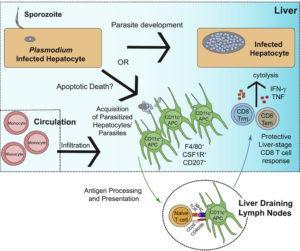Induction of robust and in some cases sterilising CD8 T cell immunity against Plasmodium parasite requires Plasmodium sporozoite infection of hepatocytes, known as the malaria liver stage. As a result, researchers believe that whole cell malaria parasite vaccines must carry out the malaria liver-stage to induce sterilising immunity. However, how protective CD8 immunity is primed during the liver-stage, where plasmodium antigens are largely constrained to non-antigen presenting hepatocytes is unknown. A study by Kurup et al., aimed to determine this, specifically focusing on which cells are important of antigen presentation of liver-stage antigens to CD8 T cells.
Kurup et al., demonstrated that a population of monocyte-derived CD11c+ antigen presenting cells (APCs) also possess plasmodium parasite in the liver. CD11c+ APCs were shown to be distinct from liver capsular macrophages because they co-expressed MHC-II, CD14, CD11b, CSF1R, CD207, Ly6C, CD104 and Tim4 molecules. They demonstrated that CD11c+ APCs only acquired the parasite following successful initiation of the malaria liver stage by plasmodium sporozoite. How these cells acquire plasmodium was not defined, however researchers suggest that CD11c+ APCs acquired plasmodium from infected hepatocytes that undergo cell death.
Presentation of exogenous antigens by APCs is typically via the MHC-II molecules. However, some APCs undergo a special form of antigen presentation known as cross presentation, where exogenous antigens are presented on MHC-I molecules. Researchers showed that CD11c+ APCs that acquire plasmodium have enriched transcriptomic expression of molecules associated with antigen cross presentation. Additionally, these cells were detected in the draining lymph node where priming of protective CD8 T cells against liver stage antigen occurs.
In summary, Kurup et al., described a previously unknown mechanism of induction of protective CD8 T cell immunity against malaria liver-stage antigens. They specifically identified a population of APCs that capture plasmodium parasite and induce CD8 T cell immunity via cross-presentation. These findings elucidate host-cell-parasite dynamics that could be harnessed to improve anti-malaria vaccines responses.
Article: Kurup et al., 2019. Monocyte- Derived CD11c+ Cells Acquire Plasmodium from Hepatocytes to Prime CD8 T Cell Immunity to Liver-Stage Malaria. Cell host & Microbe
Article by Cheleka AM Mpande












